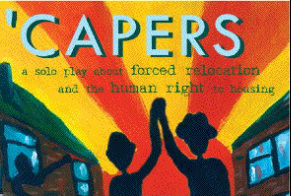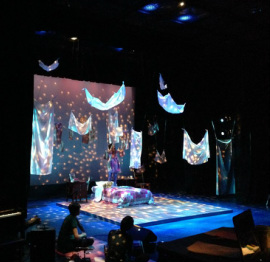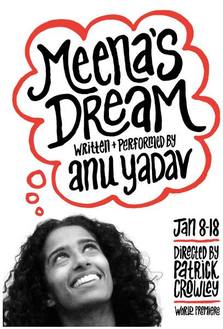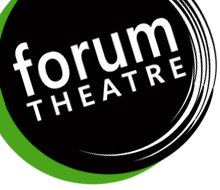|
Recently, I had the distinct pleasure of speaking with playwright Anu Yadav about her life as a playwright and the inspiration for MEENA'S DREAM, opening tomorrow at Forum Theatre. In this candid and insightful interview, Anu speaks about her love of theatre and her early collaborations with director Patrick Crowley. She also speaks quite passionately about the transformative power of writing a role for yourself and the need for social justice and change. Please enjoy.  JACQUELINE LAWTON: Why did you decide to get into theatre? Was there someone or a particular show that inspired you? ANU YADAV: Theatre has always been a part of my life from when I was young – from role-playing as a young one, to sketches in elementary school, high school and then professional productions as an adult. I’ve loved it, that simple. I think it served as a way to show myself in a big way, without the same social consequence as ‘real life.’ I was very shy as a young person, and in theater, I could be big without the fear of judgment from my peers. It felt like an escape hatch from reality. I was really inspired by performance artist Dan Kwong. I took an autobiographical performance writing workshop with him and Gary San Angel at Asian Arts Initiative in Philadelphia in 1999. It was only three weeks, during college. It was a tremendous experience. I had always loved theater, enjoyed it in whatever form it was available to me, but I also felt isolated or some sense of “I don’t belong here unless I translate myself” to the dominant culture. I didn’t see people who looked like me on stage, with the kinds of experiences that I connected to. That workshop was one of the first times that, rather than trying to fit into a role, I could shape the role by writing it myself, that my experience and my mind could lead in that way. It changed me. It was a hugely transformative experience to know that my experience as a human mattered enough to write down and share with an audience. I realized the power of sharing one’s story through theater as a political act. It helped me learn how to share more of myself in the world beyond the stage. JL: Next, tell me a little bit about your writing process. Do you have any writing rituals? Do you write in the same place or in different places? AY: I want to have more rituals than I do! I think I’m still learning. I rely heavily on stream-of-consciousness writing as a way to shoehorn myself out of writing blocks and the self-criticism and self-doubt that hampers creativity. A great artist and dear friend I admire, Caleen Jennings introduced me a clustering technique by Gabrielle Rico in her book Writing the Natural Way that was super helpful to me. It’s similar to stream-of-consciousness but a slightly different approach. What often happens is when I am intensely focused on a project I tend to let other things go, so it’s even more important for me to make sure I’m eating regularly, seeing friends and family, exercising, doing yoga – whatever can help ground me. Structuring my time and making sure I’m allowing for important life activities and my relationships helps me think better about the writing itself. I struggle with that, but it’s still important.  JL: Describe for me all the sensations you had the first time you had one of your plays produced and you sat in the audience while it was performed... what was different about the characters you created? How much input did you have in the directing of that work? AY: My work as a writer has mainly been performing my own writing, but I’m planning to have an ensemble version of all my plays, including Meena’s Dream and also a previous solo show ‘Capers. I can say that one of my first, most memorable performances was when I performed ‘Capers at the DC Hip Hop Theatre Festival in 2005, directed and developed by Patrick Crowley a longtime collaborator and close friend. It was a loving and packed crowd at the Studio Theatre, and there was one moment I was playing one character, and I improvised a line. Then I switched to another character who was surprised and responding in the moment to that improvisation. It was such a surreal experience to me as an actor to have this sensation of ‘improvising with myself,’ and the audience also noticed and clapped spontaneously in appreciation. By the end of the show, there was thunderous applause and what felt like a 20 second standing ovation. I think in large part because the story itself was about the displacement of low-income families and it was not being talked in the media as much as it should have been. There was a relief and a fierce DC pride in the audience that these stories must be heard – the realities that many people are facing demand a megaphone, with dignity, humanity, and love. It really was one of my most cherished moments as a performer. JL: What do you hope to convey in the plays that you create--what are they about? What sorts of people, situation, circumstances, do you like to write about? AY: I hope to convey… hope. I want people to be moved, to reconnect to their deeper selves, reflect on their own passions, their secret, tender wishes. I want to smash down walls of prejudice through good story. Have people in an audience be moved to connect to the experiences of people who are either very different from themselves, or by seeing themselves when they rarely get that opportunity. That to me is political, it’s revolutionary, it’s transformational. It’s a small step towards real democracy. Stereotypes, in a certain way, are nothing more than lack of character development, so think how powerfully a good story and character can rip at the seams of bias so that people can actually remember their inherent connection to each other despite, through, within, and beyond the boundaries that separate us. It opens the potential for something different to happen. I’ve been inspired by the organizing and community-building efforts of working people and families, as well as when people across any kind of difference connect in real, unguarded, and surprising ways. I like writing about that. I also like writing about any hilarious things that happen to me too. I’ve been really enjoying writing more sketch comedy lately that still addresses these themes but from a lighter angle. JL: Tell us about your play and what inspired you to write it. AY: Meena’s Dream is about a nine year-old girl whose mother is sick and can’t afford the medicine she needs. This worries her a lot, and she is plagued by nightmares. But she also has dreams and imaginings that Hindu God Lord Krishna seeks her help to fight the evil ‘Worry Machine,’ a mysterious force that threatens to destroy the universe. She has to face her fears, and use her imagination not just to cope or escape, but to bravely keep envisioning a world where all of us can have enough. I was inspired to write it in part because I wanted to write a story that was drawing from my own experience and heritage, yet not actually about my own family. I’ve wanted to write with more celebration, using more elements of fantasy. As an artist, it’s easy to fall into the trap of focusing on what I get rewarded for, and then limiting myself rather than expanding. I came to a point where I actually realized that, after writing documentary-based theater and storytelling work, I doubted that I had an imagination. I knew that wasn’t true, it’s just that I hadn’t really allowed myself to exercise my imagination and creativity in a new and different way. So, this was a chance at remembering that I can also dream! JL: What do you hope audiences are thinking about after experiencing this play? AY: I want to invite audiences to reconnect with their creativity, and sense of possibility about their own dreams as well as that of envisioning a world where all of us can have our basic needs met, our humanity respected, and truly share and honor the resources of this earth together. I know that sounds lofty, but it really is absolutely unethical that in this day and age there is such a sharp wealth inequality, and such scarcity for most people on the planet. In order to change that we have to believe it’s possible to do so. In order to believe it’s possible, we have to believe in our own ability to effect change. Social and personal transformation go hand in hand. I would love my play to support conversation about both. More than anything, I want people to leave with a sense of possibility and hope to face fear. Ultimately, social movements succeed because people come together and stand up against fear – their own and that which perpetuates the oppression they are facing. If as an artist, I can contribute in some way to any of that, I’m happy. More specifically, the play does address lack of healthcare. Meena’s mother, Aisha, cannot afford the medicine she needs, and Meena questions the system that demands Aisha have money to be healthy. I’m talking with my friends at United Workers Association and Health Care Is a Human Right- Maryland, to see ways in which the play can support their statewide grassroots campaign for universal, publicly-financed healthcare in the state of Maryland. JL: How has the community where you work and live addressed issues of race and gender parity? How has this particular issue impacted you and your ability to get your work produced on the main stages? AY: I think there is more open conversation about these issues, which is hopeful, among artists, particularly through social media. Overall, there is still a thick silence and a fear that if you push the envelope too much, you won’t get work – no matter who you are. So I think depending on your relationship to the economy of the arts industry, you have a different kind of wiggle room to challenge and be open about it. How do we both honestly challenge and honestly support each other as a community of fellow artists, arts institutions, administrators who are all working hard to keep art thriving in an economy that consumes art yet does not fund it nearly enough? Can people challenge each other and stay in the room? Are people willing to be challenged without being defensive? I think that’s extremely hard and important. Yes, race and gender parity have definitely impacted my life, and my art. How has it affected my ability to get produced on main stages? Part of it is that I haven’t always offered my work to main stages. I think I just assumed at first they weren’t interested, and I wasn’t going to wait for someone else to produce so I self-produced. Then when I was touring my solo play ‘Capers I was able to make a modest living from it for a time but most of the venues were not at theatres, but other community and educational venues. And the other is, finding and figuring out the right opportunity that coincides with the direction and mission of the theater. As a DC-based artist what I have noticed more so has been the limited opportunities for DC playwrights and artists to get work produced in DC theatres. That is definitely changing and progressing, which is fantastic. But there is a definite leaning towards artists not based in DC. What if each major theatre took on producing a local playwright at least once every 1-3 years? That would shift things tremendously. And it’s not a question of dearth of talent here either. DC playwrights can still get a lot more love!  JL: What excited you about taking part in Forum Theatre’s 10th Season? AY: I love Forum Theatre. They have been so supportive of me as a playwright in their season and I admire their courage, tenacity and vision. I love Forum’s new policy of half the seats for every show are pay-what-you-can. Theater gets to be accessible. And also they have been open to implementing more community organizing tactics as far as reaching out to potential audiences in targeted ways. I really respect that Forum supports local playwrights and artists, there is so much talent and skill to draw from here, and they recognize that. I have a lot of love for Forum, and I’m proud to be an Ensemble Member this year. JL: What advice do you have for up-and-coming playwrights? AY: Keep writing. Connect with other playwrights. Share and break bread with the artists in your community. Find your tribe and nurture it. Read other people’s work, and be generous and supportive. See everyone not as competitors but your fellow artists, we get to raise up each other. Practice enjoying other people’s successes as much as your own. Most of all, keep doing the things that keep you grounded, outside of the art itself. JL: What’s next for you as a playwright? Where can we follow your work? AY: Right now what’s on the horizon is to develop a series of comedic sketches for the web. I have another project in the pipeline about mountaintop removal, free trade and immigration policy. I do plan on taking Meena’s Dream on tour (click here to learn more), and as far as following my work, people can find me on Facebook for updates!  MEENA'S DREAM Written and performance by Anu Yadav Directed by Patrick Crowley Music by Anjna Swaminathan, Rajna Swaminathan, and Sam McCormally January 8-18, 2014 Click here for a full list of performance dates and here for ticketing information About the Play During the day, nine-year-old Meena wishes that her mother could get well; and by night, the Hindu God Lord Krishna appears, entreating Meena's help in his war against the Worry Machine.Meena's Dream creates a fantastical world through storytelling and live music, from South Indian classical to indie folk.  Forum Theatre produces adventurous, relevant, and challenging plays from a diversity of voices that inspire discussion and build community -- and that are accessible, affordable, and entertaining. Since Forum Theatre’s inception, we have aimed to be both the home for stories that provoke discussion and the place to host that discussion. We want our plays to be a conversation with the audience. We tell stories about who we are as a local, national, and global community. So what is a Forum show? That’s never been the easiest thing to describe, but a few things tend to always be true: A Forum show asks big questions. A Forum show is intricate and challenging, but has a big heart at its center. And a Forum show gives you something to think about and a lot to talk about.
0 Comments
Your comment will be posted after it is approved.
Leave a Reply. |
My BlogI'm a playwright, dramaturg, and teaching artist. It is here where you'll find my queries and musings on life, theater and the world. My posts advocate for diversity, inclusion, and equity in the American Theatre and updates on my own work. Please enjoy!
Categories
All
Archives
June 2020
Reading List
|
